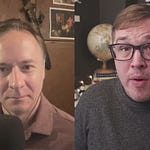Our homeschooling (but-also-parenting) workshops have now begun, and I need to focus my attention on them, I thought I’d give you a peek into what’s going on!
The above video is the second session, and unveils our approach to history & geography in elementary school.
Imaginary Interlocutor: Oh, I know about that stuff — I’ve been reading this blog!
Ah… not really. These practices in particular have evolved a lot since I’ve written about them here. We’ve developed a way to turn your entire home into a type of memory palace,1 ready to be stocked with the shiniest things that have happened over the last 13.7 billion years. And we’ve created a simple method to not just memorize the most important geography, but to begin to care about it through “marvels”.
(Also in that one session: a philosophy of building a family canon,2 a new insight into the point of elementary history, and an imaginative technique for making geography real. And, like, a hundred other things.)
But you don’t have to take my word for it —
Says one parent:
I decided to try the live Homeschool Workshops for extra guidance. Happily, the workshops (and the accompanying notes) are full of new and useful detail; the questions other participants ask are insightful. It's worked wonders so far! … I don’t know what other changes are in store, but I’m thrilled with how it’s gone to date.
– S. L. M.
Imaginary Interlocutor: What ages are you addressing?
Theoretically, first through fifth grade. More realistically, all the ages. (My wife and I are planning to do some of these practices for our sixth grader this coming fall.)
But, yet again, you don’t have to take my word for it —
Another parent says:
This! THIS is what I wish I'd had access to when I first started homeschooling! Brandon's passion oozes through the screen, and these first few workshops have already inspired me to refocus and see the big picture in my daughter's education. Not only that, but we've already been given several ideas and tools that can be implemented immediately! Yes, this is aimed more towards younger students, but building a solid foundation now is better than continuing somewhat blindly on precarious limbs. I can already see and piece together how to make this foundation and build upon it for my middle school student.
– R. F.
Imaginary Interlocutor: Hmm. What’re all the topics you’re covering, again?
Yes — all. The. Topics. The whole kit-and-kaboodle of elementary school; you can see the whole list on the webpage. Tomorrow, though, we’ll be unwrapping what elementary school science can look like when it’s powered by Egan’s engine.
Imaginary Interlocutor: Ah! Is that one going to be the usual Science is WEIRD song-and-dance?
Actually, it’s going to walk you through the juiciest stuff I’m not able to squeeze into Science is WEIRD. It’ll be simple, meaningful practices that you can do with your kids that’ll help them orient themselves in the natural world — the roots of biology, physics, and astronomy. A few have been mentioned on this substack; a few more haven’t been yet.
Imaginary Interlocutor: My family is… different. Will this work for us?
I haven’t met you so I really can’t say, but we do have a money-back guarantee. Also, there’s this thing a parent said —
I’ve always felt like we didn’t quite fit into any of the usual homeschooling styles—and navigating it all as a neurodivergent, multicultural family hasn’t always been easy. These Science is WEIRD workshops feel like landing on an alien planet and realizing this is where I’m actually from. Just two sessions in, I’ve already picked up ideas I couldn’t wait to try—and my kids were instantly hooked. It’s been thought-provoking, grounding, and genuinely exciting. I can’t wait for more!
– L. C.
Imaginary Interlocutor: Remind me — where is this all heading?
A year ago I got a grant from Manifund to publish a book on Egan education for parents. The original plan had been to write that book this summer… and then I realized that the only way I know to write something rich and clear is to first teach about it. (That was, incidentally, one of my tricks for writing my ACX book review of Educated Mind — you can now find the sessions on YouTube.)
So think of these workshops as the first draft of the book. It’s our take on the big picture of what a total education can look like, in practice.
In the words of yet another parent:
It is so refreshing to step back and think about the “why” and the “how” of homeschool with someone who so obviously loves to learn, wants their kids to love to learn, and wants your kids to love to learn too.
– N. G.
Imaginary Interlocutor: This all sounds interesting; however, like 98% of parents in the developed world, I send my kids to school. Does this have relevance for us non-homeschoolers?
Absolutely. We’re building these practices to be as simple as possible (as I say in the workshop, the history-related ones are the most complex; it’s all downhill from there), and I volunteer that many of them will be things you’ll love folding into your home life.
And if you watch them, and decide they’re not, goodness, just ask for your money back! (It’s the 21st century, and we’re a small, personable company.)
Also, like it says on the webpage, if the price is too high for you, ping us, and we’ll work out a price that works for you.
Imaginary Interlocutor: Are these actually easy to apply?
Eh! Some of them, yes for everyone. Others of them, yes for some people. And some of them, no, not yet — this is all a work in progress. But if you sign up, you’ll also get access to the notes we’ve been compiling on these practices for a year, and also access to our “Skeleton Army”, where you can ask questions and get help from folks who’ve been doing this for a while.
But maybe I’m being too pessimistic on this —
As another puts it:
[J]ust from the two [workshops] I've seen so far, I'm inspired to incorporate many of the history and geography ideas into our upcoming homeschool year. It's so refreshing that these are innovative, relatively easy, low or no cost suggestions for bringing life back into the content in a way that I know my kids will enjoy and remember. Originally, I was planning to use a more traditional curriculum for history this school year and supplement with Brandon's ideas, but now I'm planning to reverse that. I'll let Brandon's ideas and the plethora of provided resources be the dominant force in our history learning and supplement with the curriculum I already purchased and library books. In the end, I think my kids are going to remember SO much more!
– M. S.
Imaginary Interlocutor: My approach to education is already pretty settled. Will these workshops help me?
If you enjoy this blog and have kids, I’d be surprised if they didn’t. In the words of someone else who’s taking it:
As a homeschooler that values both “academic” and “passion-led” learning, Brandon’s workshops are a beautiful resource for blending these two seemingly polar approaches into rich, complex, and captivating opportunities for my children. Having spent so much time putting together materials from scratch in the past, learning about these tools that support our philosophical approach to education feels like a new breath of life into our journey.
– A. R.
So, there’s all that! (And thanks to the participants for being willing to share your thoughts on the workshops in exchange for lucrative cash rewards out of the goodness of your hearts.)
Now I’m going to crawl back into my thinking space and put some flourishes on Thursday’s math workshop…
Feel free to pop any questions into the comments.
Hat tip to Edward Nevraumont and Christopher Brenna for the inspiration to do this!
Before you get too excited, you might want to reacquaint yourself with the spelling of “cannon”.







